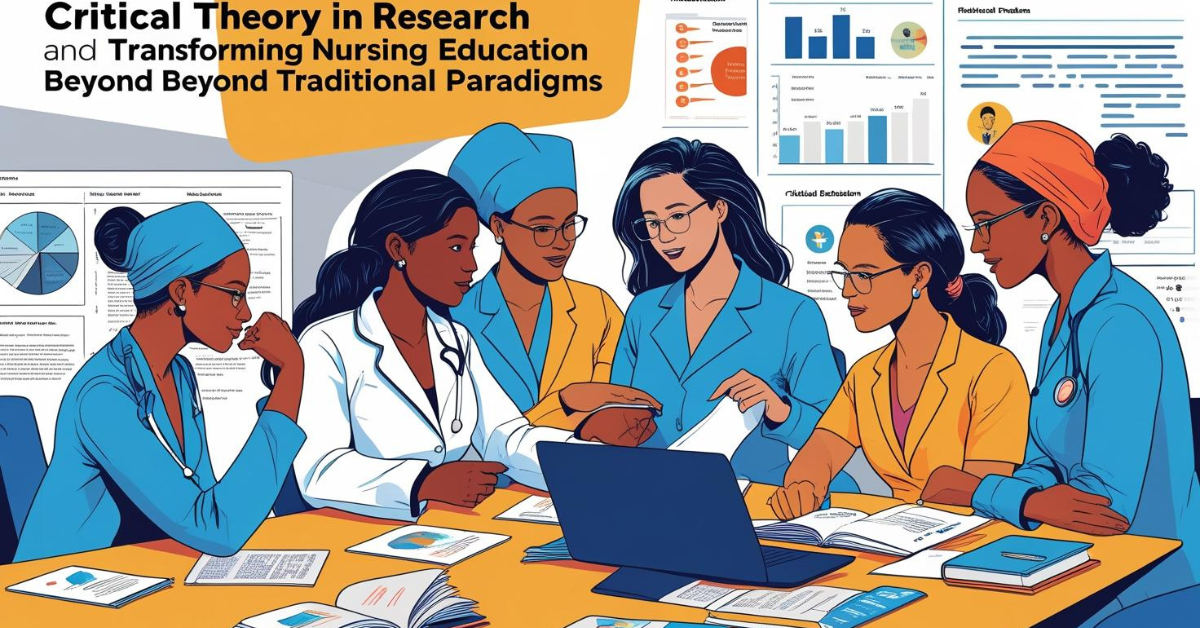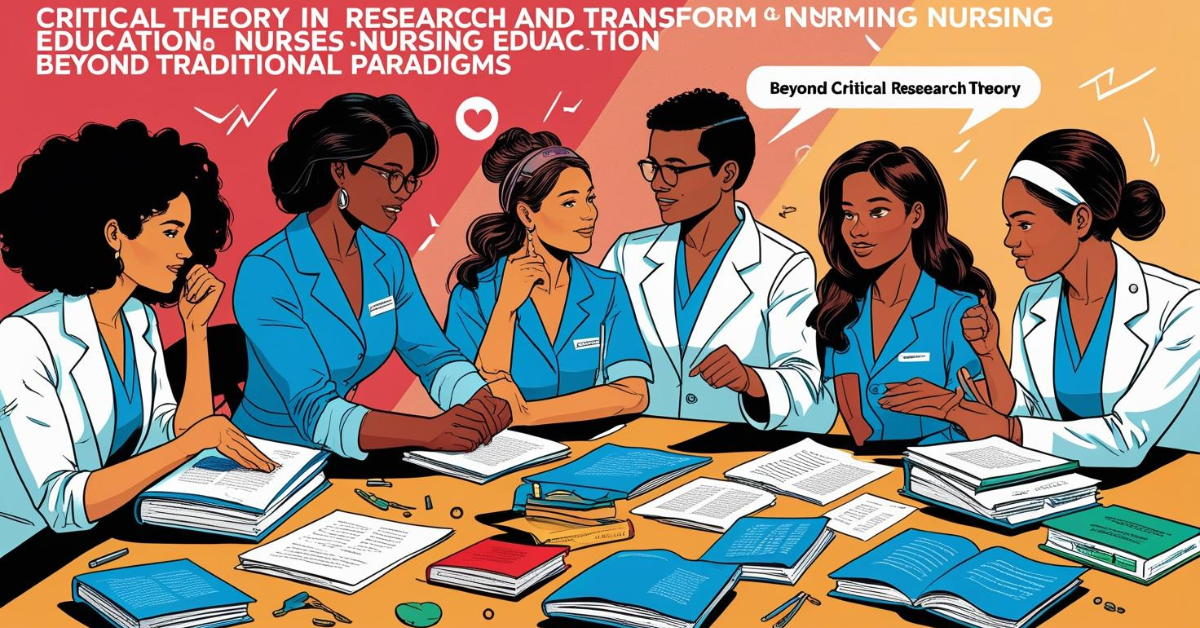The Critical Theory in Research and Transforming Nursing Education Beyond Traditional Paradigms. Critical theory in nursing research and education focuses on the analysis of power structures, social inequalities, and their impact on healthcare. The goal is to transform nursing practice and education beyond traditional paradigms. This approach encourages nurses to critically examine healthcare systems, question existing norms, and advocate for social justice. By integrating critical perspectives, nursing education can better prepare students to address systemic issues and promote equitable health outcomes.
What a Critical Theory in Research and Transforming Nursing Education Beyond Traditional Paradigms
By incorporating critical theory into nursing education, institutions can better prepare nurses to address the complex social and ethical challenges of healthcare and promote a more just and equitable system.
Why Need for Critical Perspectives in Nursing Education
It emphasizes the need to address social inequalities and promote health equity for marginalized populations. Critical theory promotes the development of transformative knowledge that can lead to social and health reforms.
Let Understanding the Three Research Paradigms in Nursing Education
What is Positivist Paradigm in Nursing Research
Positivist and interpretive paradigms are essentially concerned with understanding phenomena through two different lenses. Positivism strives for objectivity, measurability, predictability, controllability, patterning, the construction of laws and rules of behavior, and the ascription of causality; the interpretive paradigms strive to understand and interpret the world in terms of its actors.
What Is Interpretive Paradigm in Nursing Research
In the former, observed phenomena are important; in the latter, meanings and interpretations are paramount. Habermas (1984:109–10) describes this latter as a ‘double hermeneutic’, where people strive to interpret and operate in an already interpreted world.
By way of contrast, an emerging approach to educational research is the paradigm of critical educational research. This regards the two previous paradigms as presenting incomplete accounts of social behavior by their neglect of the political and ideological contexts of much educational research.
What is Critical Paradigm
As Transformative Approach to Nursing Education
Positivistic and interpretive paradigms are seen as preoccupied with technical and hermeneutic knowledge respectively (Gage, 1989). The paradigm of critical educational research is heavily influenced by the early work of Habermas and, to a lesser extent, his predecessors in the Frankfurt School, most notably Adorno, Marcuse, Horkheimer and Fromm. Here the expressed intention is deliberately political—the emancipation of individuals and groups in an egalitarian society.
Critical theory is explicitly prescriptive and normative; entailing a view of what behavior in a social democracy should entail (Fay, 1987; Morrison, 1995a). Its intention is not merely to give an account of society and behavior but to realize a society that is based on equality and democracy for all its members. Its purpose is not merely to understand situations and phenomena but to change them. In particular it seeks to emancipate the disempowered, to redress in equality and to promote individual freedoms within a democratic society.
In this enterprise critical theory identifies the ‘false’ or ‘fragmented’ consciousness (Eagleton, 1991) that has brought an individual or social group to relative powerlessness or, indeed, power, and it questions the legitimacy of this. It holds up to the lights of legitimacy and equality issues of repression, voice, ideology, power, participation, representation, inclusion, and interests.
It argues that much behavior (including research behavior) is the outcome of particular illegitimate, dominator and repressive factors, illegitimate in the sense that they do not operate in the general interest—one person’s or group’s freedom and power is bought at the price of another’s freedom and power. Hence critical theory seeks to uncover the interests at work in particular situations and to interrogate the legitimacy of those interests—identifying the extent to which they are legitimate in their service of equality and democracy.
Its intention is transformative: to transform society and individuals to social democracy. In this respect the purpose of critical educational research is in tensely practical—to bring about a more just, egalitarian society in which individual and collective freedoms are practiced, and to eradicate the exercise and effects of illegitimate power. The pedigree of critical theory in Marxism, thus, is not difficult to discern. For critical theorists, researchers can no longer claim neutrality and ideological or political innocence.
Critical theory and critical educational research, then, have their substantive agenda—for example examining and interrogating: the relationships between school and society—how schools perpetuate or reduce inequality; the social construction of knowledge and curricula, who defines worthwhile knowledge, what ideological interests this serves, and how this reproduces inequality in society; how power is produced and reproduced through education; whose interests are served by education and how legitimate these are (e.g. the rich, white, middle class males rather than poor, non-white, females).
The significance of critical theory for research is immense, for it suggests that much social research is comparatively trivial in that it accepts rather than questions given agendas for research. That this is compounded by the nature of funding for research underlines the political dimension of research sponsorship (discussed later) (Norris, 1990). Critical theorists would argue that the positivist and interpretive paradigms are essentially technicity, seeking to understand and render more efficient an existing situation, rather than to question or transform it.
How Habermas’s Three Knowledge Interests Applied to Nursing Education
Habermas (1972) offers a useful tripartite conceptualization of interests that catches the three paradigms of research in this blog post. He suggests that knowledge—and hence research knowledge—serves different interests. Interests, he argues, are socially constructed, and are ‘knowledge-constitutive’, because they shape and determine what counts as the objects and types of knowledge.
What are Technical Interest in Nursing Education
Interests have an ideological function (Morrison, 1995a), for example a ‘technical interest’ (discussed below) can have the effect of keeping the empowered in their empowered position and the disempowered in their powerlessness—i.e. reinforcing and perpetuating the status quo. An ‘emancipatory interest’ (discussed below) threatens the status quo. In this view knowledge—and research knowledge—is not neutral (see also Mannheim, 1936). What counts as worthwhile knowledge is determined by the social and positional power of the advocates of that knowledge.
The link here between objects of study and communities of scholars echoes Kuhn’s (1962) notions of paradigms and paradigm shifts, where the field of knowledge or paradigm is seen to be only as good as the evidence and the respect in which it is held by ‘authorities’. Knowledge and definitions of knowledge reflect the interests of the community of scholars who operate in particular paradigms. Habermas (1972) constructs the definition of worthwhile knowledge and modes of understanding around three cognitive interests:
- prediction and control;
- understanding and interpretation;
- emancipation and freedom.
He names these the ‘technical’, ‘practical’ and ‘emancipatory’ interests respectively. The technical interest characterizes the scientific, positivist method outlined earlier, with its emphasis on laws, rules, prediction and control of behavior, with passive research objects—instrumental knowledge.
What is Practical Interest in Nursing Education
The ‘practical’ interest, an attenuation of the positivism of the scientific method, is exemplified in the hermeneutic, interpretive methodologies outlined in the qualitative approaches earlier (e.g. symbolic interactionism). Here research methodologies seek to clarify, understand and interpret the communications of ‘speaking and acting subjects’ (Habermas, 1974:8). Hermeneutics focuses on interaction and language; it seeks to understand situations through the eyes of the participants, echoing the verstehen approaches of Weber and premised on the view that reality is socially constructed (Berger and Luckman, 1967).
Indeed Habermas (1988:12) suggests that sociology must understand social facts in their cultural significance and as socially determined. Hermeneutics involves recapturing the meanings of interacting others, recovering and reconstructing the intentions of the other actors in a situation. Such an enterprise involves the analysis of meaning in a social context (Held, 1980). Gadamer (1975:273) argues that the hermeneutic sciences (e.g. qualitative approaches) involve the fusion of horizons between participants. Meanings rather than phenomena take on significance in this paradigm.
Emancipatory Interest in Nursing Education
The emancipatory interest subsumes the previous two paradigms; it requires them but goes be yond them (Habermas, 1972:211). It is concerned with praxis—action that is informed by reflection with the aim to emancipate (Kincheloe, 1991:177). The twin intentions of this interest are to expose the operation of power and to bring about social justice as domination and repression act to pre vent the full existential realization of individual and social freedoms (Habermas, 1979:14).
The task, of this knowledge-constitutive interest, indeed of critical theory itself, is to restore to conscious ness those suppressed, repressed and submerged determinants of unfree behavior with a view to their dissolution (Habermas, 1984:194–5). What we have in effect, then, in Habermas’s early work is an attempt to conceptualize three research styles: the scientific, positivist style; the interpretive style; and the emancipatory, ideology critical style.
The Methodology
What is Critical Research Approaches in Nursing Education
Not only does critical theory have its own research agenda, but it also has its own research methodologies, in particular ideology critique and action research. With regard to ideology critique, a particular reading of ideology is being adopted here, as the suppression of generalizable interests (Habermas, 1976:113), where systems, groups and individuals operate in rationally indefensible ways because their power to act relies on the disempowering of other groups, i.e. that their principles of behavior are not unverbalizable. Ideology—the values and practices emanating from particular dominant groups—is the means by which powerful groups promote and legitimate their particular— sectoral—interests at the expense of disempowered groups.
Ideology critique exposes the operation of ideology in many spheres of education, the working out of vested interests under the mantle of the general good. The task of ideology critique is to uncover the vested interests at work which may be occurring consciously or subliminally, revealing to participants how they may be acting to perpetuate a system which keeps them either empowered or disempowered (Geuss, 1981), i.e. which suppresses a generalizable interest.
Explanations for situations might be other than those ‘natural’, taken for granted, explanations that the participants might offer or accept. Situations are not natural but problematic (Carr and Kemmis, 1986). They are the outcomes or processes wherein interests and powers are protected and suppressed, and one task of ideology critique is to expose this (Grundy, 1987).
Habermas’s Four-Stage Process Applied to Nursing
The interests at work are uncovered by ideology critique, which, itself, is premised on reflective practice (Morrison, 1995a, 1995b, 1996a). Habermas (1972:230) suggests that ideology critique through reflective practice can be ad dressed in four stages:
Stage 1 A description and interpretation of the existing situation—a hermeneutic exercise that identifies and attempts to make sense of the current situation (echoing the verstehen approaches of the interpretive paradigm).
Stage 2 A penetrations of the reasons that brought the existing situation to the form that it takes—the causes and purposes of a situation and an evaluation of their legitimacy, involving an analysis of interests and ideologies at work in a situation, their power and legitimacy (both in micro- and macro-sociological terms). In
Habermas’s early work (1972) he likens this to psychoanalysis as a means for bringing into consciousness of ‘patients’ those repressed, distorted and oppressive conditions, experiences and factors that have prevented them from a full, complete and accurate understanding of their conditions, situations and behavior, and that, on such exposure and examination, will be laboratory and emancipatory.
Critique here serves to reveal to individuals and groups how their views and practices might be ideological distortions that, in their effects, are perpetuating a social order or situation that works against their democratic freedoms, interests and empowerment (see also Carr and Kemmis, 1986:138–9).
Stage 3 An agenda for altering the situation—in order for moves to an egalitarian society to be furthered.
Stage 4 An evaluation of the achievement of the situation in practice. In the world of education Habermas’s stages are paralleled by Smyth (1989) who, too, denotes a four-stage process: description (what am I doing?); information (what does it mean?); confrontation (how did I come to be like this?); and reconstruction (how might I do things differently?).
It can be seen that ideology critique here has both a reflective, theoretical and a practical side to it; without reflection it is hollow and without practice it is empty. As ideology is not mere theory but impacts directly on practice (Eagleton, 1991) there is a strongly practical methodology implied by critical theory, which articulates with action research (Callewaert, 1999).
Action Research in Nursing Education
Action research as its name suggests, is about research that impacts on, and focuses on, practice. In its espousal of practitioner research, for example teachers in schools, participant observers and curriculum developers, action research recognizes the significance of contexts for practice—locational, ideological, historical, managerial, social. Further more it accords power to those who are operating in those contexts, for they are both the engines of research and of practice.
In that sense the claim is made that action research is strongly empowering and emancipatory in that it gives practitioners a ‘voice’ (Carr and Kemmis, 1986; Grundy, 1987), participation in decision-making, and control over their environment and professional lives. Whether the strength of the claims for empowerment are as strong as their proponents would hold is another matter, for action research might be relatively pow erless in the face of mandated changes in educa tion.
Challenges and Limitations of Critical Nursing Educational Research
Here action research might be more concerned with the intervening in existing practice to ensure that mandated change is addressed efficiently and effectively. Morrison (1995a) suggests that critical theory, because it has a practical intent to transform and empower, can—and should—be examined and perhaps tested empirically. For ex ample, critical theory claims to be empowering; that is a testable proposition.
Indeed, in a departure from some of his earlier writing, in some of his later work Habermas (1990) acknowledges this; he argues for the need to find ‘counter examples’ (p. 6), to ‘critical testing’ (p. 7) and empirical verification (p. 117). He acknowledges that his views have only ‘hypothetical status’ (p. 32) that need to be checked against specific cases (p. 9).
One could suggest, for instance, that the effectiveness of his critical theory can be examined by charting the extent to which equality, freedom, democracy, emancipation, empowerment have been realized by dint of his theory, the extent to which transformative practices have been addressed or occurred as a result of his theory, the extent to which subscribers to his theory have been able to assert their agency, the extent to which his theories have broken down the barriers of instrumental rationality.
The operationalization and testing (or empirical investigation) of his theories clearly is a major undertaking, and one which Habermas has not done. In this respect critical theory, a theory that strives to improve practical living, runs the risk of becoming merely contemplative.
Read More:
https://nurseseducator.com/didactic-and-dialectic-teaching-rationale-for-team-based-learning/
https://nurseseducator.com/high-fidelity-simulation-use-in-nursing-education/
First NCLEX Exam Center In Pakistan From Lahore (Mall of Lahore) to the Global Nursing
Categories of Journals: W, X, Y and Z Category Journal In Nursing Education
AI in Healthcare Content Creation: A Double-Edged Sword and Scary
Social Links:
https://www.facebook.com/nurseseducator/
https://www.instagram.com/nurseseducator/
https://www.pinterest.com/NursesEducator/
https://www.linkedin.com/in/nurseseducator/
https://www.researchgate.net/profile/Afza-Lal-Din
https://scholar.google.com/citations?hl=en&user=F0XY9vQAAAAJ


